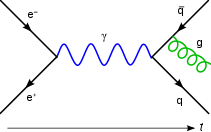
Back نظرية الحقل الفعال Arabic Teoría de campo efectivo Spanish Théorie effective French Teoria di campo efficace Italian 有効場の理論 Japanese 유효 이론 Korean Эффективная теория поля Russian Effektiv fältteori Swedish Efektif alan teorisi Turkish 有效場論 Chinese
This article includes a list of general references, but it lacks sufficient corresponding inline citations. (May 2013) |
| Quantum field theory |
|---|
 |
| History |
It has been suggested that this article be merged into Effective theory. (Discuss) Proposed since November 2024. |
In physics, an effective field theory is a type of approximation, or effective theory, for an underlying physical theory, such as a quantum field theory or a statistical mechanics model. An effective field theory includes the appropriate degrees of freedom to describe physical phenomena occurring at a chosen length scale or energy scale, while ignoring substructure and degrees of freedom at shorter distances (or, equivalently, at higher energies). Intuitively, one averages over the behavior of the underlying theory at shorter length scales to derive what is hoped to be a simplified model at longer length scales. Effective field theories typically work best when there is a large separation between length scale of interest and the length scale of the underlying dynamics. Effective field theories have found use in particle physics, statistical mechanics, condensed matter physics, general relativity, and hydrodynamics. They simplify calculations, and allow treatment of dissipation and radiation effects.[1][2]
- ^ Galley, Chad R. (2013). "Classical Mechanics of Nonconservative Systems". Physical Review Letters. 110 (17): 174301. arXiv:1210.2745. Bibcode:2013PhRvL.110q4301G. doi:10.1103/PhysRevLett.110.174301. PMID 23679733. S2CID 14591873.
- ^ Birnholtz, Ofek; Hadar, Shahar; Kol, Barak (2014). "Radiation reaction at the level of the action". International Journal of Modern Physics A. 29 (24): 1450132–1450190. arXiv:1402.2610. Bibcode:2014IJMPA..2950132B. doi:10.1142/S0217751X14501322. S2CID 118541484.